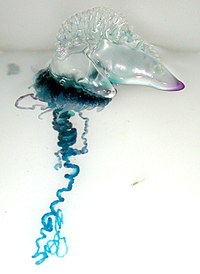
Photo from wikipedia
Background Bacillus genus has been used in horticultural crops as a biocontrol agent against insect pests, microbial phytopathogens, and plant growth-promoting bacteria (PGPB), representing an alternative to agrochemicals. In particular,… Click to show full abstract
Background Bacillus genus has been used in horticultural crops as a biocontrol agent against insect pests, microbial phytopathogens, and plant growth-promoting bacteria (PGPB), representing an alternative to agrochemicals. In particular, B. cereus (Bc) and B. thuringiensis (Bt) have been studied for their fungicidal and insecticidal activities. However, their use as biofertilizer formulations and biocontrol agents against phytopathogenic bacteria is limited. Objective To evaluate Bc and Bt formulations as PGPB and biocontrol agents against the bacterial spot agent Xanthomonas euvesicatoria (Xe) in greenhouse-grown chili peppers. Methods Bc and Bt isolates obtained from soil samples were identified and characterized using conventional biochemical and multiplex PCR identification methods. Bioassays to determine Bc and Bt isolates potential as PGPB were evaluated on chili pepper seedlings in seedbeds. In addition, formulations based on Bc (F-BC26 and F-BC08) and Bt (F-BT24) strains were assessed as biofertilizers on pepper, under controlled conditions. Furthermore, in vitro antagonism assays were performed by confronting Bc and Bt isolate formulations against Xe isolates in direct (foliage) and indirect (resistance induction) phytopathogen biocontrol assays on pepper plants, which were grown under controlled conditions for 15 d after formulations treatment. Results Isolates were identified as Bc and Bt. Formulations significantly improved pepper growth in seedbeds and pots, whereas in vitro bioassays demonstrated the bactericidal effect of Bc and Bt strains against Xe isolates. Furthermore, assays showed significant plant protection by F-BC26, F-BC08, and F-BT24 formulated strains against Xe. Conclusion Results indicated that F-BT24 and F-BC26 isolates formulations promoted pepper growth and protected it against Xanthomonas euvesicatoria.
Journal Title: PeerJ
Year Published: 2023
Link to full text (if available)
Share on Social Media: Sign Up to like & get
recommendations!